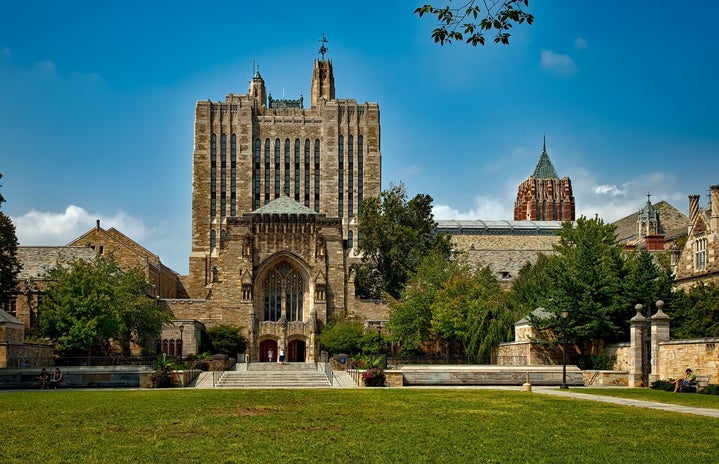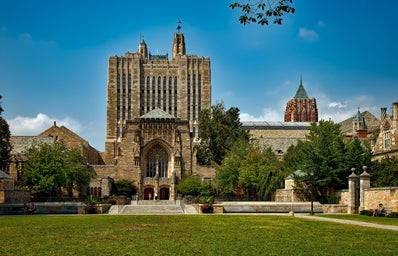Preferred name: Salma Adil Yousif
Age: 20
Birth Country: USA
Country of residence: Qatar/U.S. for school
Age when moved to Qatar: 7
Major: Journalism & Communications, German minor
Q: Can you go over what your living situation is currently and how it came to be?
SAY: Currently, I live in the U.S. for college. I was born here, so I’m taking advantage of being able to live here and attend university here for the experience, and to have the U.S. college life. During winter and summer breaks, I go home to Qatar because I have residency there. That’s where my parents work, both of them are Sudanese nationals. I was raised in Qatar for most of my life so that’s what I call home, and that will always be home for me.
Q: What has been your favorite moment or is the most exciting part of living in this country?
SAY: The independence and being on my own. I enjoy the responsibilities that come with living here in Connecticut, living in my own apartment, taking care of things for myself. Being back in the U.S. was a culture shock for me and it was hard to adapt to it. Even though I was born here, I was away for so long and was raised in a different culture, so it’s very different. I also really like traveling in the U.S. There’s a lot to see and many places to visit, and that has been very pleasant.
Q: What has been the hardest or most discouraging part about living in this country?
SAY: It’s still very difficult for me to be away from my family. Not a day goes by where I don’t think about my family; where they are or what they’re doing at any point in time. It sucks that I only get to see them twice a year (winter and summer break). Not only is missing my family difficult, but the ever changing state of the U.S. is very discouraging.
Not only am I an Arab American, but I’m also a Black Muslim woman in this country. Learning about the various hate crimes against the minority groups that I fall into, and even those that I don’t fall into, it worries me and it also pains me every time I hear about those kinds of things. So that is discouraging, it’s disappointing, it’s disrespectful and it’s upsetting. It makes me feel fearful of the direction in which this country is going.
Q: Do you hope to continue living in the U.S. after college?
SAY: At first I didn’t know. I didn’t mind the thought of it, I thought I might want to stay and start at a local news station and work my way up. Maybe I would move all around the U.S. if necessary. Honestly, my feelings have changed now. There is more of a discomfort in wanting to stay here longer than I feel that I need to be here. Sometimes, I’ll hear something in the news or I’ll experience something and I’ll think that I just want to get my my diploma and then leave. Sometimes, I’ll think that things are going great and the U.S. has great opportunities and that I would like to stay after college. It’s very up and down for me.
Q: Do you remember the first time you realized that you were part of a marginalized minority group?
SAY: When I moved to Qatar, I realized that there were a lot of people like me there. There was a larger group of Sudanese people, Blacks, Muslims, Arabs, etc. Coming back to the States, I didn’t think anything of [my cultural identity], but when people asked where I was from, suddenly it was like, “Oh…She’s from Qatar.” I say that because that’s where I’m from, that’s where I was raised, and that’s what I know. Qatar is my home. Then they start asking me ridiculous questions like, “Oh do you guys have cars?”, “Do you guys have traffic lights?”, and “Do you listen to Drake?”
Even though these aren’t directly offensive, they still are offensive. It just goes to show how uncultured some individuals are around me, and they jump to the conclusion that just because I’m from the Middle East, I haven’t experienced some of the things that they have. If I’m from the Middle East, people really assume that I don’t have a car. Like, really? That’s your assumption? So I guess people did see me differently. They did have a lot of questions and they looked at me differently. They were all curious. It was like being looked at like you’re in an exhibition.
Q: What are some of the positive aspects of the culture of the country you go home to- be they political, religious, or otherwise- that have helped make you who you are?
SAY: I speak Arabic fluently as a second language. I am a Muslim. I was raised by Sudanese parents, and Sudan is an Afro/Arab country. Growing up in Qatar was a pleasant experience because it definitely shaped who I am today. I feel connected to my Arab roots and have a deeper understanding of who I am today and my culture and my religion. The majority of the people around me spoke the language I spoke, engaged in the same activities I engaged in; it was very comforting.
Qatar has a very impressive and diverse community. It is filled with individuals from all over the world. My friend group was made up of Qatar natives, people from all around the Gulf, Germans, Colombians, Canadians, Filipinos, Indians, Italians, Croatians- you name it. My best friend is half German half Seychellois (which is a little island above Madagascar). Being around all these people from different countries, backgrounds, and cultures, you are exposed to their cultures and languages and so you get to learn about them. Growing up in Qatar was a blessing and it still is a blessing being able to go there so frequently. It’s very amazing and I am very grateful.
Q: How do you contribute to the community in the U.S., especially at UConn?
SAY: I’m focusing on trying to get my credits in and finish my majors and degree. I think I do my part. I try my best to keep people informed. I like to answer questions. When things like [the Muslim ban] happen and people have questions for me, as someone who has Sudanese parents, I am directly affected and able to give them some perspective. Let’s say my dad had booked a ticket to visit me, he wouldn’t be able to because he has a Sudanese passport. But I enjoy when my peers ask me these kinds of questions, like, “What’s it like in the Middle East?”, “What’s this like in Arab culture?”, etc. I enjoy answering these questions because I [want to] give them my perspective as someone who has experience with these things. If this gets dragged on to next year or even come graduation time, my own dad may not be able to come to my graduation. Because I am so personally involved in current events, I can be a resource for people who may not understand.
Q: What are your goals for the future and how have those goals been shaped by your experience at UConn?
SAY: I want to go into broadcast journalism and become a reporter. I want to focus on international journalism all around the world. I want to report on global news, global issues, and focus on things that are happening around the world because it’s important. I feel like everyone needs to know what’s going on around the world. How can I live knowing that people are still asking me whether the Middle East has cars or not? I don’t know where I want to work specifically, but I do, at some point, want to get home and go to Qatar because Al Jazeera is there, that’s its home base. It would be nice to work for them. I [want to] travel and report on what I see, go all around the world, and tell everyone’s story.
Q: As someone who has been all around the world, how do you view America in terms of the way we treat minorities?
SAY: There’s a lot of opportunity for a lot of people here. I think it often depends a lot on the state. I’ve never have bad experiences in Boston, Connecticut, or New York, but I did have a layover in Texas once and was treated terribly. I have friends who are Palestinian Arabs in Texas who have serious issues coping with everything that’s going on right now. Any time I’m transiting in Europe, I never have issues except for one time in Germany. [Other than that] it’s always been pretty smooth. London Heathrow has the most diverse staff, so I never have issues there. Paris and Zurich are also great. But the States is so large and there are so many different parts, so it’s hit or miss.
Q: Is there anything else that you want to say to anyone reading this about your experience as a person who lives in both Qatar and the USA?
SAY: I have had various experiences as someone who travels a lot. I fall into so many minority groups (Black, Muslim, Arab, woman, African- you name it). I travel back and forth and I’ve been discriminated against so many times. I got stuck in Germany my freshman year for over 24 hours just for a “random search.” I got questioned and this was literally all because they were confused as to why I had an Arabic name and an American passport and why I lived in the United States for so long but had residency in Qatar. These kind of things are so upsetting because I have all my documents. The day that ban went into effect, I felt for everybody. When you have all your documents and you get stuck for no good reason (which has happened to me, my siblings, and my parents), I feel for all of them. You have to start understanding what people are going through.
Photos provided by Salma Adil Yousif


